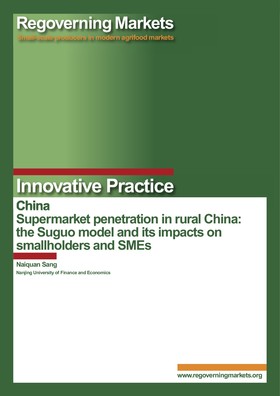China: Supermarket penetration in rural China: the Suguo model and its impacts on smallholders and SMEs
This case study of Suguo supermarket is one of 32 case studies of innovative practice in connecting small-scale producers and SMEs with dynamic markets as part of IIED's Regoverning Markets Programme. The case study focused on Suguo's supermarket business model and its impacts on smallholders and SMEs. The innovations in this case are twofold: the supermarket penetrated the rural market by extending its network of stores gradually from metropolitan cities into the countryside, and it expanded its market share by offering franchises to cooperatives.
This rural-oriented business strategy had a positive impacts on both production and consumption for smallholders in the region. Chinese Premier Wen Jiabao recommended Suguo supermarket as a successful model and the Chinese television station CCTV broadcast a five-programme series about Suguo model in August, 2005. Inspired by the Suguo model, the Ministry of Commerce has created a project~called ‘Markets for 1,000 towns and 10,000 villages'. This project aims to open 250,000 chain stores at village level in next three years.
This publication forms part of the Regoverning Markets project.
Cite this publication
Available at https://www.iied.org/g03242
